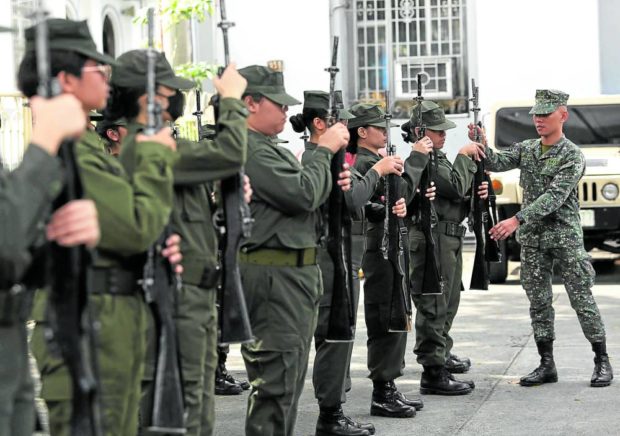
A Marine trains a group of students enrolled in the Reserve Officers’ Training Corps (ROTC) in handling a rifle. (File photo by MARIANNE BERMUDEZ / Philippine Daily Inquirer)
MANILA, Philippines — Two youth groups on Monday called for the expansion of the National Service Training Program (NSTP) instead of the revival of the mandatory Reserve Officers’ Training Corps (ROTC).
Justine Luis Balane, chair of the Akbayan Youth, explained the idea during a Senate subcommittee hearing on making ROTC compulsory.
“Whatever the students choose – whether ROTC, Civic Welfare Training Service, or Literacy Training Service — all of those are forms of showing one’s love for the country. The youth should be free to choose how they want to serve their motherland,” Balane said in Filipino.
Requiring the ROTC, according to Balane, strips the youth of the freedom to choose the program most suitable for their skills and talents.
“We believe that to ensure that our future is safe it’s important that we broaden our concept of security because the foundation of peace, order, and justice lies in the people’s economic security, health security — which as we know was made vulnerable during the pandemic — and the security of people who have the knowledge of reading and science,” Balane said.
These, he said, can be addressed under an expanded NSTP and not through the mandatory ROTC.
“Our recommendation is that, instead of making ROTC mandatory, we should extend the NSTP,” Balane said.
The NSTP should branch out to involve students in combating disinformation, improving cybersecurity, data science and technology, and addressing the health needs of the country, he added.
“It’s important to increase the programs under the NSTP so that the youth can be free to choose how they can help others,” Balane said.
Addressing the learning crisis
Ken Gilo, chair of the Student Council Alliance of the Philippines (SCAP), echoed Balane’s suggestion.
He also stressed the need to redirect government efforts to address the learning crisis, citing the learning poverty and dropout rates among students nationwide.
“These are some of the indications that our education sector is in a crisis and that it needs attention and funds. We can say the Senate will find a way to fund the program. But if that’s the case, it got SCAP thinking that we already have the capacity and funds all along,” he said in Filipino.
Gilo said the budget for the implementation of the ROTC program could instead be used to build lacking classrooms, provide gadgets and other educational materials for students, and hire more guidance counselors in schools to augment efforts that would address the rising suicide cases among students.
“If we can find a way to get funds, I hope we can prioritize the factors causing the education crisis and burdening ordinary students,” he said.
Gilo similarly called to expand the NSTP to maximize the expertise of every student.
‘No bearing’
But Sen. Ronald “Bato” dela Rosa — a staunch advocate for the revival of mandatory ROTC — said these calls had no bearing on the issue.
Asked in a press briefing what the effect would be of the students’ suggestion, he said: “None. It has no bearing. As I said, that’s in the Constitution. The Constitution is very clear in what it says.”
He cited Section 4, Article 2 of the Constitution which states: “The prime duty of the government is to serve and protect the people. The government may call upon the people to defend the State and, in fulfillment thereof, all citizens may be required, under conditions provided by law, to render personal, military or civil service.”
“The option to choose personal, civil, military, or civil service, is up to the government. That’s not an option available to every citizen,” he said.
Dela Rosa also argued that the mandatory ROTC program would allow the government to tap students to augment military forces in case of foreign attacks.
Fully implementing mandatory ROTC, which is being eyed to be fully implemented in the academic year 2024-2025, would call for a budget of P16 billion to P20 billion, depending on the composition of personnel running the program, according to an estimate by the Department of National Defense (DND).
But the DND said the amount might decrease once other considerations are factored in.
One consideration, for example, is the proposal of Commissioner Prospero de Vera III of the Commission on Higher Education to use and cluster the existing ROTC offices in higher education institutions to trim down costs.

